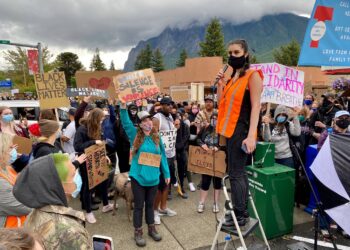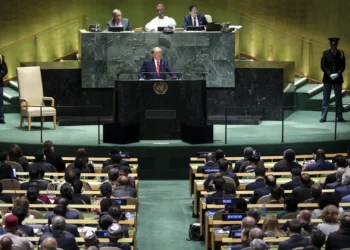Under President Donald Trump’s renewed immigration crackdown, a political fault line has erupted with seismic force—most visibly in Los Angeles, where the deployment of Marines to restore order has triggered a media frenzy, progressive outrage, and what some are calling a full-blown psychological breakdown among Democrats and their media allies.
In a WarRoom segment on Wednesday, Steve Bannon and Rasmussen Reports pollster Mark Mitchell dissected the fallout. The spark? Marines rolling into L.A. to assist with mass deportations, triggering furious comparisons by critics to historic war zones and even British troops in the Boston Massacre. One MSNBC figure bemoaned that "the strawberries are running in the fields,” as if the absence of illegal laborers is tantamount to economic ruin. It was a moment Bannon called "unhinged,” and Mitchell framed as the elites "saying the quiet part out loud.”
The polling data, according to Mitchell, cuts directly against the noise. A massive 80% of Americans say it is important to deport criminal illegal aliens, including over 70% of Democrats. Hispanic voters—long assumed to be sympathetic to open-border policies—are increasingly aligned with Trump on this issue. A stunning 72% support deporting Venezuelan gang members, and large majorities favor impeachment of lenient immigration judges. As Mitchell put it, "The numbers are off the charts. They’ve never been higher.”
President Trump’s public approval reflects the shift. Before the renewed deportation efforts, he was trending at net +1. Now, he’s pushing +5 with a potential 53% approval rating looming—his highest since taking office. Trump’s focus on law, order, and economic restoration—not vague campaign platitudes—has solidified support across demographics. More Americans now believe the country is heading in the right direction than at any point in the last 20 years.
In contrast, California Governor Gavin Newsom has planted his flag on what many see as a losing hill. He’s gone all-in defending sanctuary city policies, provoking a crisis of optics as Marines, ICE, and Border Patrol confront chaos in California’s urban strongholds. Bannon and Mitchell mocked the decision as either naive or malicious. "It looks like he’s reenacting 1970s revolutionary cosplay,” Bannon said, referencing historical riots in Asbury Park, New Jersey, now being mirrored almost street-for-street in L.A. "He sounds like a new Confederate.”
Mitchell didn’t hold back either. "This is the hill Newsom’s choosing to die on? Ten out of ten people see that and go, ‘This is insanity.’” To Mitchell, the governor’s actions—amid visuals of uniformed Marines restoring order—come off not as leadership, but as desperation. He raised the possibility that foreign actors or shadow financiers may be fueling the chaos, hinting at "Global homo billionaire philanthropists” and long-running organizing campaigns online, especially through Reddit and progressive subcultures.
Both men see this as more than a border or immigration issue. It’s a flashpoint in the national debate over sovereignty, law, and the legitimacy of state defiance. "They’re acting like secessionists,” Bannon observed. "This isn’t just about politics. This is about representation, constitutional authority, and whether a state can ignore federal law.”
As Trump doubles down on mass deportations and redeploys federal resources into sanctuary strongholds, the American people appear to be siding with the rule of law. The Biden-era narrative—where law enforcement was demonized and open borders romanticized—has crumbled under the weight of public opinion, economic pressure, and spiraling urban disorder.
This isn’t a policy disagreement anymore. It’s a collision between two worldviews—one rooted in sovereignty and enforcement, the other in performative resistance and media spectacle. With Trump’s numbers surging and support for deportation solidifying across racial and party lines, the question now is: How far will the opposition go to resist a mandate the public clearly supports?
Status: Situation Fluid — Momentum with Federal Enforcement
Priority: Monitor Media Narrative, Public Response, State Resistance Movements
For more context, watch this whole segment featuring Mark Mitchell:





![Bannon’s WarRoom, Show Clip Roundup 11/7/2024 [AM]](https://warroom.org/wp-content/uploads/2024/11/WarRoom-Logo-75x75.jpg)